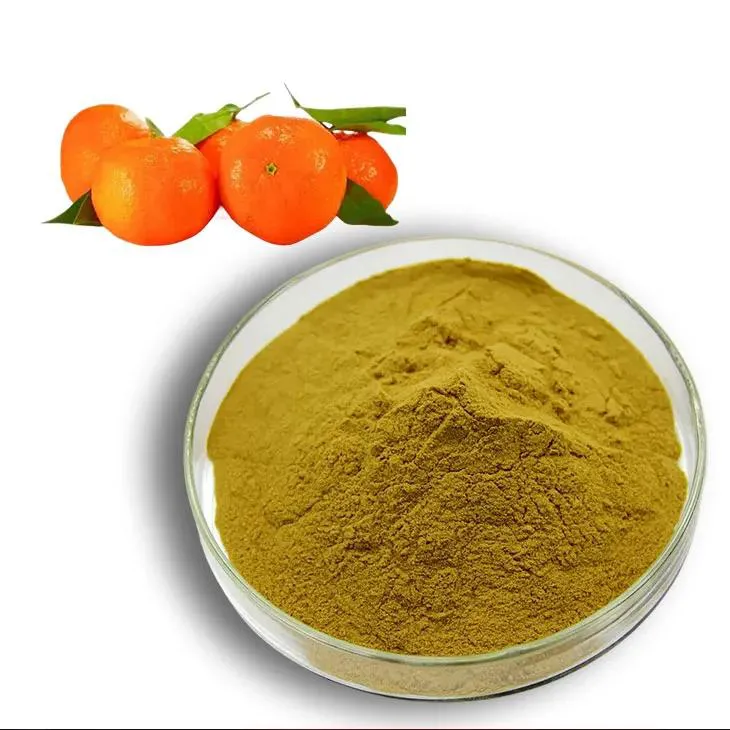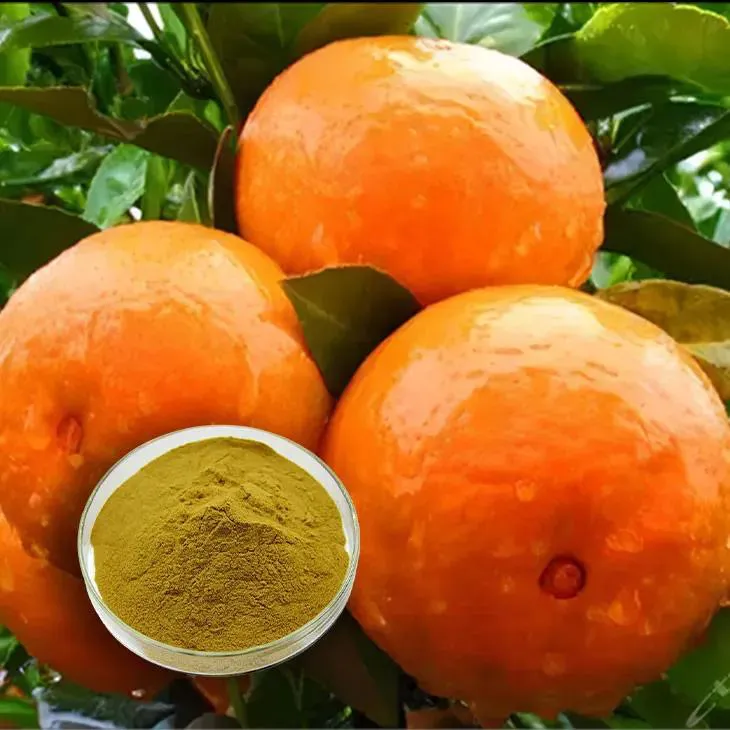- 0086-571-85302990
- sales@greenskybio.com
Citrus bioflavonoids are the hero ingredients your skin needs without your knowledge.
2024-11-14

Introduction
When it comes to skincare, we often hear about well - known ingredients like vitamin C, retinol, and hyaluronic acid. However, there is an unsung hero that has been quietly working wonders for our skin - Citrus bioflavonoids. These compounds, found abundantly in citrus fruits such as oranges, lemons, and grapefruits, offer a plethora of benefits for skin health. In this article, we will explore how Citrus bioflavonoids provide antioxidant protection, enhance collagen production, and soothe skin inflammation, making them a must - know for achieving healthy and radiant skin.

Antioxidant Protection
Citrus bioflavonoids are powerful antioxidants. In our modern world, our skin is constantly exposed to environmental stressors such as ultraviolet (UV) radiation, pollution, and free radicals. Free radicals are unstable molecules that can damage our skin cells, leading to premature aging, wrinkles, and a dull complexion.
How They Work
These bioflavonoids work by neutralizing free radicals. They donate electrons to the free radicals, thereby stabilizing them and preventing them from causing further damage to the skin. This antioxidant activity is crucial in maintaining the integrity of the skin's cells and protecting it from the harmful effects of environmental factors.
Comparative Advantage
Compared to other antioxidants, citrus bioflavonoids have some unique properties. For example, they can enhance the antioxidant activity of vitamin C. Vitamin C is already a well - known antioxidant in skincare, but when combined with citrus bioflavonoids, its effectiveness is amplified. This synergy between the two can provide more comprehensive antioxidant protection for the skin than either ingredient alone.

Enhancing Collagen Production
Collagen is the most abundant protein in our skin and is essential for maintaining its elasticity and firmness. As we age, collagen production naturally declines, leading to sagging skin and the formation of wrinkles.
The Role of Citrus Bioflavonoids
Citrus bioflavonoids play a significant role in enhancing collagen production. They stimulate the fibroblasts, which are the cells responsible for producing collagen in the skin. By promoting the activity of these fibroblasts, citrus bioflavonoids can help to increase the amount of collagen in the skin, resulting in a more youthful and plump appearance.
Long - Term Benefits
Regular use of products containing citrus bioflavonoids can have long - term benefits for skin health. Over time, the increased collagen production can help to reduce the appearance of fine lines and wrinkles, improve skin texture, and enhance overall skin elasticity. This can make the skin look more firm and taut, giving it a more youthful and healthy glow.

Soothe Skin Inflammation
Skin inflammation can be caused by a variety of factors, including allergies, skin conditions such as eczema and psoriasis, and exposure to irritants. Inflammation can lead to redness, itching, and discomfort, and if left untreated, can also cause long - term damage to the skin.
Anti - Inflammatory Mechanisms
Citrus bioflavonoids have anti - inflammatory properties. They work by inhibiting the production of inflammatory mediators in the skin, such as cytokines and prostaglandins. By reducing the levels of these inflammatory mediators, citrus bioflavonoids can help to soothe inflamed skin, reducing redness, itching, and discomfort.
Benefits for Sensitive Skin
For those with sensitive skin, citrus bioflavonoids can be a particularly beneficial ingredient. Sensitive skin is more prone to inflammation and irritation, and products containing citrus bioflavonoids can help to calm and protect the skin. They can also help to strengthen the skin's barrier function, making it more resistant to external irritants.
How to Incorporate Citrus Bioflavonoids into Your Skincare Routine
Now that we know the benefits of citrus bioflavonoids for skin health, the next question is how to incorporate them into our skincare routine.
Topical Applications
There are many skincare products available that contain citrus bioflavonoids. These include serums, creams, and masks. When choosing a product, look for ones that list citrus bioflavonoids high on the ingredient list. Apply these products to clean, dry skin, following the instructions on the product label.
Dietary Intake
In addition to topical applications, you can also increase your intake of citrus bioflavonoids through your diet. Eating citrus fruits such as oranges, lemons, and grapefruits is an excellent way to get these beneficial compounds. You can also drink citrus juices or take citrus bioflavonoid supplements, although it is important to consult a healthcare professional before starting any new supplement regimen.
Conclusion
In conclusion, citrus bioflavonoids are an unsung hero ingredient that offers a wide range of benefits for skin health. From providing antioxidant protection to enhancing collagen production and soothing skin inflammation, these compounds can play a significant role in achieving healthy and radiant skin. Whether through topical applications or dietary intake, incorporating citrus bioflavonoids into your skincare routine can be a great way to give your skin the care it needs. So, the next time you are looking for a new skincare ingredient to try, don't overlook the power of citrus bioflavonoids.
FAQ:
What are citrus bioflavonoids?
Citrus bioflavonoids are a group of plant - based compounds found in citrus fruits such as oranges, lemons, and grapefruits. They are known for their various health - promoting properties, including those beneficial for the skin.
How do citrus bioflavonoids offer antioxidant protection to the skin?
Citrus bioflavonoids act as antioxidants by neutralizing free radicals in the skin. Free radicals are unstable molecules that can damage skin cells and lead to premature aging, wrinkles, and other skin problems. The bioflavonoids donate electrons to these free radicals, making them more stable and preventing them from causing harm.
Can citrus bioflavonoids really enhance collagen production?
Yes, they can. Collagen is essential for maintaining the skin's elasticity and firmness. Citrus bioflavonoids stimulate fibroblasts, the cells responsible for producing collagen in the skin. By promoting collagen synthesis, they help keep the skin looking youthful and reduce the appearance of fine lines and wrinkles.
How do citrus bioflavonoids soothe skin inflammation?
Citrus bioflavonoids have anti - inflammatory properties. They can inhibit the production of inflammatory mediators in the skin, such as cytokines and prostaglandins. This helps to calm irritated skin, reduce redness, and ease conditions like acne, eczema, and psoriasis.
Are there any side effects of using products with citrus bioflavonoids on the skin?
Generally, products containing citrus bioflavonoids are safe for most people. However, some individuals may be allergic to citrus fruits and may experience allergic reactions. It is also important to follow the recommended usage instructions when using skincare products with these ingredients to avoid any potential irritation.
Related literature
- The Role of Citrus Bioflavonoids in Skin Health: A Comprehensive Review"
- "Citrus Bioflavonoids: Skin - Nourishing Compounds from Nature"
- "Antioxidant and Anti - Inflammatory Properties of Citrus Bioflavonoids for Skin"
- ▶ Hesperidin
- ▶ citrus bioflavonoids
- ▶ plant extract
- ▶ lycopene
- ▶ Diosmin
- ▶ Grape seed extract
- ▶ Sea buckthorn Juice Powder
- ▶ Beetroot powder
- ▶ Hops Extract
- ▶ Artichoke Extract
- ▶ Reishi mushroom extract
- ▶ Astaxanthin
- ▶ Green Tea Extract
- ▶ Curcumin Extract
- ▶ Horse Chestnut Extract
- ▶ Other Problems
- ▶ Boswellia Serrata Extract
- ▶ Resveratrol Extract
- ▶ Marigold Extract
- ▶ Grape Leaf Extract
- ▶ blog3
-
Cranberry Plants and Skin - care Products.
2024-11-14
-
Ginger Extract
2024-11-14
-
Buckthorn bark extract
2024-11-14
-
Clove Powder
2024-11-14
-
Genistein
2024-11-14
-
Selenium yeast
2024-11-14
-
Saw Palmetto Extract
2024-11-14
-
Bilberry Extract
2024-11-14
-
Thunder God Vine Extract
2024-11-14
-
Apricot Powder
2024-11-14
-
Dandelion Root Extract
2024-11-14





















